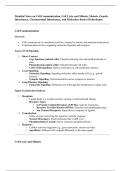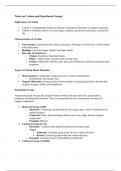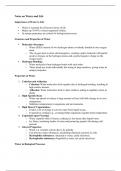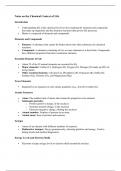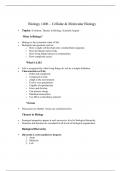BIOL 1309 (BIOL1406)
Austin Community College
All 8 results
Sort by
cell communication, cell division, genetics and inheritance, and DNA replication.
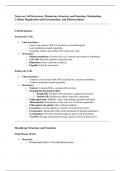
-
Cell structures
- Class notes • 4 pages • 2024
-
- $7.99
- + learn more
Describe the cell theory. Describe some factors that limit cell size. Describe the typical prokaryotic cell (e.g. size, plasma membrane, cell wall, cytoplasm, ribosomes, nucleoid and flagella.) Describe the typical eukaryotic cell and explain the structure and function of: nucleus and nucleolus, endomembrane system, ribosomes, mitochondria, plastids, the cytoskeleton and cilia, flagella and centrioles. Compare and contrast the characteristics of prokaryotes, eukaryotes and viruses. Des...
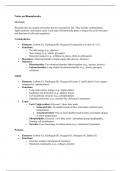
-
Biomolecules
- Class notes • 2 pages • 2024
-
- $7.99
- + learn more
Describe structures and functions of carbohydrates, lipids, proteins and nucleotide based compounds. Describe four levels of protein structure and how they relate to protein activity. Describe the structure of nucleotides. Describe the DNA molecule.
Identify some characteristics of carbon that allow it to play such an important role in the chemistry of life. Describe isomers in biology. Identify functional groups of biological molecules.
Describe properties of water and explain their importance to living systems. Describe the properties of acids, bases, and salts. Define pH. Describe the roles buffers play in living organisms.
Describe the basic structure of atoms. Interpret chemical and structural formulas. Describe ionic and covalent bonds. Describe hydrogen bonds and nonpolar interactions, and their importance for living organisms.
This covers the basics of biology fundamentals including scientific themes, evolution, chemistry for biology, water chemistry and pH, functional groups, and biomolecules.
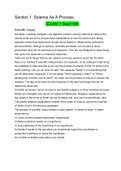
-
BIOL 1309 Final Exam Study Guide Latest Version A+ Scores.
- Other • 138 pages • 2021
-
- $28.00
- + learn more
EXAM 1 Sept18th Scientific Inquiry Scientists, including biologists, use objective problem solving methods to observe the natural world and arrive at reasonable explanations of how the world works. Being objective means that researchers should not be biased or influenced by someone's personal beliefs, feelings or opinions. Scientific processes can be used to study phenomena that can be observed and measured. They are not designed to study things that cannot be observed or measured object...

How much did you already spend on Stuvia? Imagine there are plenty more of you out there paying for study notes, but this time YOU are the seller. Ka-ching! Discover all about earning on Stuvia

